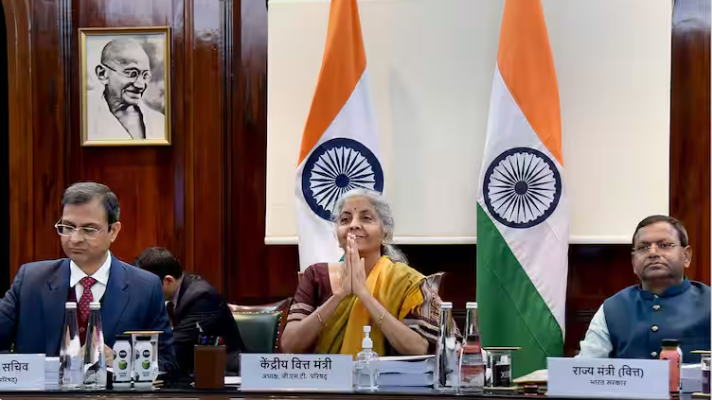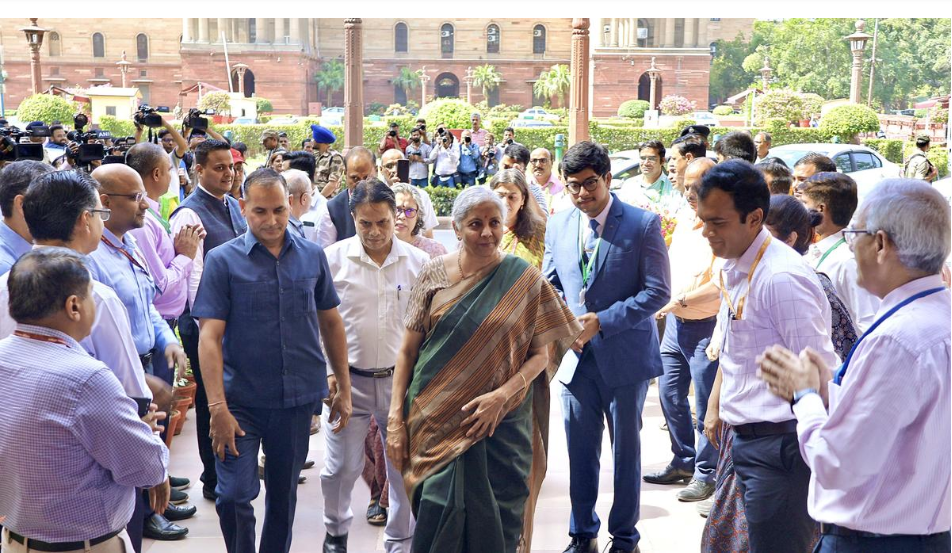GST Council to Meet for the First Time This Year on June 22:-
GST Council Goods and Services Tax (GST) Council is set to convene for its first meeting of the year on June 22. This highly anticipated gathering is expected to address several crucial issues that have been building up over the past months. As the central decision-making body for the GST regime in India, the Council’s resolutions can significantly impact various sectors of the economy, consumer prices, and the overall business environment.
Background: Understanding the GST Council
The GST Council is a constitutional body tasked with making recommendations to the Union and State governments on issues related to Goods and Services Tax. It comprises the Union Finance Minister as the Chairperson, the Union Minister of State for Finance, and the Finance Ministers of all the states. The Council aims to ensure a uniform tax structure and administration across the country, facilitating ease of doing business and improving tax compliance.
Since its inception, the GST Council has played a pivotal role in shaping India’s tax landscape. It has made numerous decisions to refine the GST system, addressing challenges such as tax rate rationalization, compliance simplification, and revenue distribution between the Centre and the States.  for more information click on this link
for more information click on this link
Key Agenda Items for the Meeting
The June 22 meeting comes at a time when several pressing issues need the Council’s attention. Here are some of the key items likely to be discussed:
- Rate Rationalization and Exemptions
- Reducing Tax Slabs: One of the most anticipated discussions is around the rationalization of GST rates. Currently, there are multiple tax slabs (5%, 12%, 18%, and 28%), which many argue complicates the tax structure. A simplified tax regime with fewer slabs could enhance compliance and reduce litigation.
- Sector-Specific Exemptions: The Council might also consider granting or revising exemptions for certain sectors. Industries such as real estate, textiles, and automobiles have been lobbying for tax relief to boost demand and reduce costs.
- Compensation to States
- Revenue Shortfall: The compensation mechanism for states to make up for any revenue loss due to GST implementation has been a contentious issue. With the compensation period ending soon, the Council needs to address the future of this mechanism. Ensuring states’ revenues do not suffer is crucial for maintaining the federal balance.
- Extension of Compensation Cess: There is speculation that the Council might extend the compensation cess beyond the current deadline to continue supporting state finances. This extension could provide the necessary fiscal space for states to manage their budgets more effectively.
- Compliance and Technology Upgrades
- Simplifying Returns Filing: The complexity of GST return filings has been a persistent complaint from businesses. The Council may introduce measures to simplify the filing process, making it more user-friendly and less time-consuming.
- Technological Enhancements: Upgrading the GST Network (GSTN) to handle increased data loads and improve user experience is another critical area. Enhanced technology can facilitate better compliance and reduce errors.
- Taxation on Essential Goods and Services
- Healthcare and Education: With the ongoing COVID-19 pandemic, there is a strong case for reviewing the GST rates on healthcare and education services. Reducing the tax burden on these essential sectors could provide much-needed relief to the public.
- Fuel and Electricity: Bringing petroleum products and electricity under the GST regime is a long-debated issue. While politically sensitive, including these items under GST could streamline the tax structure and potentially reduce prices for consumers.
Potential Impacts of the Council’s Decisions
The outcomes of the GST Council meeting on June 22 could have far-reaching implications for various stakeholders, including businesses, consumers, and state governments. Here’s a look at some potential impacts:
- Business Community
- Enhanced Ease of Doing Business: Simplifying the GST rate structure and return filing process can significantly reduce the compliance burden on businesses, fostering a more conducive environment for growth and investment.
- Sectoral Relief: Specific tax reliefs and exemptions can help struggling sectors recover faster, boosting economic activity and employment.
- Consumers
- Price Stability: Rationalizing GST rates can lead to more predictable and stable pricing of goods and services, benefiting consumers. Additionally, tax relief on essential goods and services can lower the cost of living.
- Better Services: With improved compliance and technological upgrades, the overall efficiency of the GST system will increase, leading to better service delivery and fewer disputes.
- State Governments
- Fiscal Stability: Decisions on compensation and revenue-sharing are critical for state finances. Ensuring adequate compensation can help states manage their budgets without cutting essential services.
- Federal Harmony: A balanced approach in addressing state concerns can maintain harmony between the Centre and the states, fostering cooperative federalism.
 for more information click on this link
for more information click on this link
Challenges and Considerations
While the agenda for the GST Council meeting is ambitious, several challenges need careful consideration:
- Balancing Interests
- The Council must balance the interests of various stakeholders, including different states, sectors, and consumer groups. Achieving consensus on contentious issues such as tax rate changes and compensation mechanisms will require skilled negotiation and compromise.
- Implementation Roadblocks
- Even after decisions are made, effective implementation remains a challenge. Ensuring that changes are seamlessly integrated into the existing system without causing disruptions is crucial. This requires robust planning and coordination between the Centre and the states.
- Economic Context
- The broader economic context, including inflation, global economic conditions, and domestic fiscal constraints, will influence the Council’s decisions. Policymakers need to be mindful of these factors to avoid unintended economic consequences.
Looking Ahead: The Future of GST in India
The upcoming GST Council meeting marks a significant step in the ongoing evolution of India’s tax system. As the GST regime matures, continuous refinement and adaptation are necessary to address emerging challenges and leverage new opportunities.
Medium-Term Goals:
- Stable and Predictable Tax Environment: Establishing a stable tax regime with minimal changes can provide businesses with the predictability they need to plan and invest confidently.
- Broader Tax Base: Expanding the tax base by including more goods and services under GST can enhance revenue without increasing tax rates, ensuring the sustainability of the system.
- Improved Compliance: Ongoing efforts to simplify compliance and leverage technology can further enhance the efficiency and effectiveness of the GST regime.
Long-Term Vision:
- Harmonized Tax System: A fully harmonized GST system that minimizes the cascading effect of taxes and eliminates the need for multiple layers of taxation can significantly boost India’s economic competitiveness.
- Inclusive Growth: Ensuring that the benefits of the GST system are equitably distributed across different regions and socio-economic groups is essential for inclusive growth.
Conclusion
The GST Council’s meeting on June 22 is poised to address several critical issues that have significant implications for India’s economy. By focusing on rate rationalization, state compensation, compliance simplification, and taxation of essential goods, the Council aims to refine and strengthen the GST regime.
As the new fiscal year progresses, the decisions made during this meeting will set the tone for the future of GST in India. Stakeholders across the spectrum will be keenly watching the outcomes, hoping for resolutions that promote growth, stability, and fairness in the tax system.
The path forward may be challenging, but with collaborative efforts and a commitment to continuous improvement, the GST Council can steer India towards a more efficient and equitable tax environment. As we look ahead, the potential for a robust GST system to drive economic progress and social well-being remains immense. ALSO READ:- A New Chapter in Civil Aviation: Prioritizing Airfare Review” conveys a positive sentiment 2024





1вин официальный сайт вход familyclub.borda.ru/?1-6-0-00002163-000-0-0-1743051813 .
1win kg скачать http://familyclub.borda.ru/?1-6-0-00002163-000-0-0-1743051813 .
1вин про https://1win6001.ru/ .
mostbet kg скачать mostbet kg скачать .
win 1 win 1 .
казино онлайн kg https://mostbet6006.ru/ .
mostbet casino http://mostbet6006.ru .
мотбет http://mostbet6006.ru/ .
1win букмекер 1win букмекер .
игра 1вин игра 1вин .
1вин официальный сайт 1вин официальный сайт .
1win официальный сайт вход http://www.balashiha.myqip.ru/?1-12-0-00000437-000-0-0-1743258848 .
1win win http://www.1win6049.ru .
1win. pro 1win. pro .
адин вин http://alfatraders.borda.ru/?1-0-0-00004932-000-0-0-1743258210 .
1win вход https://balashiha.myqip.ru/?1-12-0-00000437-000-0-0-1743258848 .
1win,com http://www.balashiha.myqip.ru/?1-12-0-00000437-000-0-0-1743258848 .
1вин кыргызстан balashiha.myqip.ru/?1-12-0-00000437-000-0-0-1743258848 .
1win на телефон https://obovsem.myqip.ru/?1-9-0-00000059-000-0-0-1743051936/ .
1win партнёрка http://obovsem.myqip.ru/?1-9-0-00000059-000-0-0-1743051936 .
1вин про 1win6050.ru .
мостбет кг svstrazh.forum24.ru/?1-18-0-00000136-000-0-0-1743260517 .
1vin https://obovsem.myqip.ru/?1-9-0-00000059-000-0-0-1743051936/ .
1win сайт 1win сайт .
мостбет скачать мостбет скачать .
1win сайт 1win сайт .
mostbet mostbet .
мостбет скачать андроид https://svstrazh.forum24.ru/?1-18-0-00000136-000-0-0-1743260517/ .
1вин https://www.1win6051.ru .
1win казино https://1win6052.ru/ .
1win скачать последнюю версию http://1win6052.ru .
1 win казино https://www.1win6051.ru .
1win.kg https://1win6051.ru .
1vin kg http://www.1win6052.ru .
1вин официальный http://1win6053.ru .
скачать mostbet на телефон http://mostbet6029.ru .
1 win сайт https://www.1win6053.ru .
ваучер 1win ваучер 1win .
1 win md 1win5011.ru .
1win pariuri https://www.1win5011.ru .
pariuri sportive moldova 1win5011.ru .
поддержка мостбет http://mostbet6012.ru/ .
1wi https://1win6009.ru .
мосбет казино http://mostbet6012.ru .
1win. https://1win6009.ru .
mostber mostber .
1win.kg 1win.kg .
Продамус промокод Продамус промокод .
купить пластиковые окна http://oknasibirinsk.ru .
????? 888starz ????? 888starz .
банкротство физлиц https://bankrotstvo-fiz-lic-moscow.ru/ .
Рекомендую услуги проверенных хакеров. Обращался, сделали все быстро и качественно – Хакеры прошедшие проверку .
окна на заказ окна на заказ .
Advantageous offer https://www.criticalmass.sk/wp-pages/pages/poleznye_svoystva_zakalivaniya.html .
дренаж вокруг дома цена под ключ .
Thanks for the article https://www.pubpub.org/user/snezanna-borisova .
Thanks for the article https://cardsfm.ru/metizy-dlya-stroitelstva-i-proizvodstva-kak-vybrat-i-zakazat-v-sankt-peterburge/
Thanks for the article https://wakelet.com/wake/qE6-fyhPjRaZXOyl9_O4R .